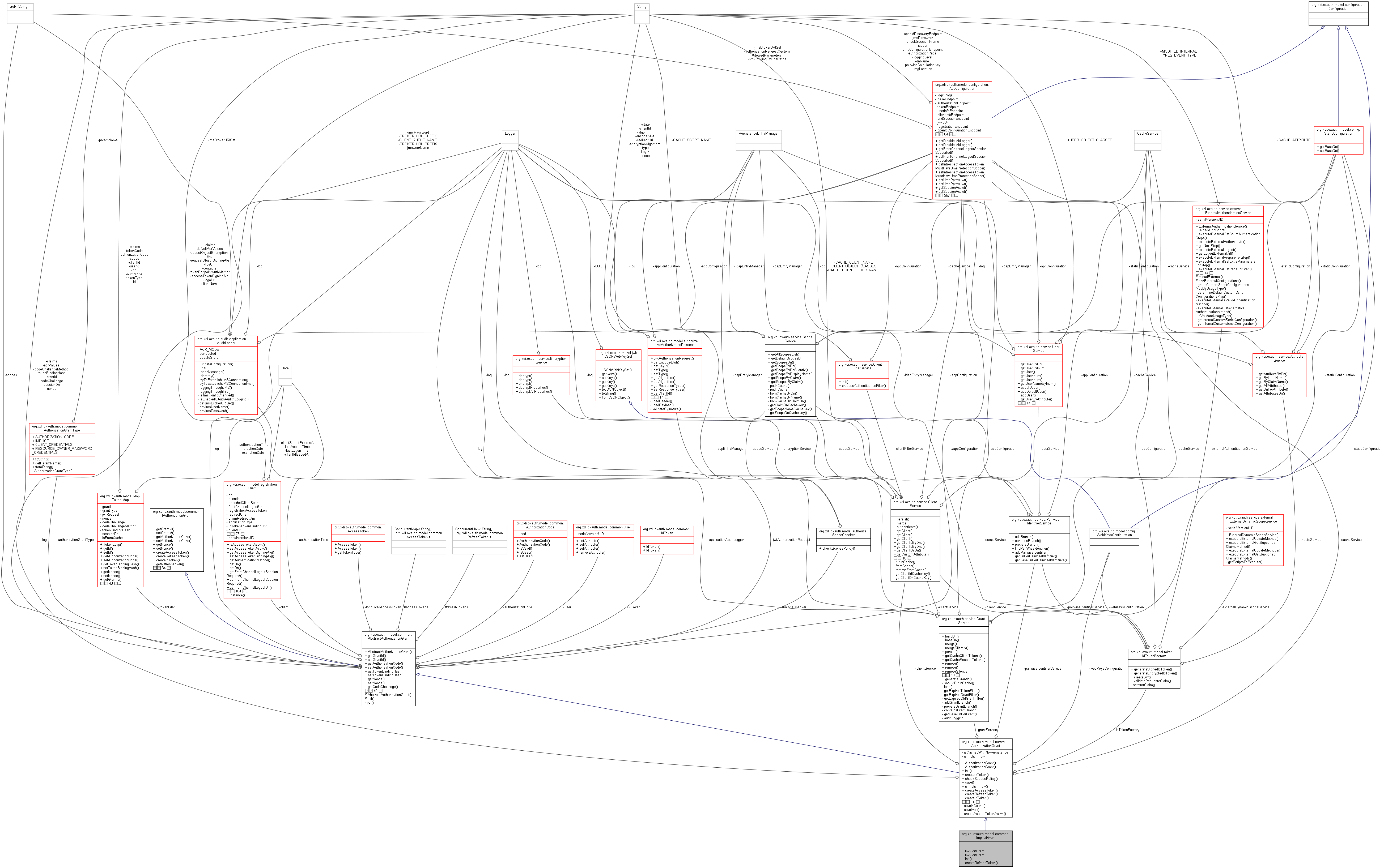

限定公開変数類 | |
| AppConfiguration | appConfiguration |
| ScopeChecker | scopeChecker |
| final ConcurrentMap< String, AccessToken > | accessTokens = new ConcurrentHashMap<String, AccessToken>() |
| final ConcurrentMap< String, RefreshToken > | refreshTokens = new ConcurrentHashMap<String, RefreshToken>() |
詳解
The implicit grant is a simplified authorization code flow optimized for clients implemented in a browser using a scripting language such as JavaScript. In the implicit flow, instead of issuing the client an authorization code, the client is issued an access token directly (as the result of the resource owner authorization). The grant type is implicit as no intermediate credentials (such as an authorization code) are issued (and later used to obtain an access token).
When issuing an implicit grant, the authorization server does not authenticate the client. In some cases, the client identity can be verified via the redirection URI used to deliver the access token to the client. The access token may be exposed to the resource owner or other applications with access to the resource owner's user-agent.
Implicit grants improve the responsiveness and efficiency of some clients (such as a client implemented as an in-browser application) since it reduces the number of round trips required to obtain an access token. However, this convenience should be weighed against the security implications of using implicit grants, especially when the authorization code grant type is available.
構築子と解体子
◆ ImplicitGrant() [1/2]
◆ ImplicitGrant() [2/2]
|
inline |
Constructs an implicit grant.
- 引数
-
user The resource owner. client An application making protected resource requests on behalf of the resource owner and with its authorization. authenticationTime The Claim Value is the number of seconds from 1970-01-01T0:0:0Z as measured in UTC until the date/time that the End-User authentication occurred.
関数詳解
◆ asToken() [1/4]
◆ asToken() [2/4]
|
inlineinherited |
◆ asToken() [3/4]
|
inlineinherited |
◆ asToken() [4/4]
|
inlineinherited |
◆ asTokenLdap()
|
inlineinherited |
◆ checkExpiredTokens()
|
inlineinherited |
◆ checkScopesPolicy()
|
inlineinherited |
org.xdi.oxauth.model.common.IAuthorizationGrantを実装しています。
◆ createAccessToken()
|
inlineinherited |
org.xdi.oxauth.model.common.IAuthorizationGrantを実装しています。
◆ createIdToken() [1/2]
|
inlineinherited |
◆ createIdToken() [2/2]
|
inlineinherited |
org.xdi.oxauth.model.common.IAuthorizationGrantを実装しています。
◆ createRefreshToken()
|
inline |
The authorization server MUST NOT issue a refresh token.
◆ getAccessToken()
|
inlineinherited |
Gets the access token instance from the id token list or the access token list given its code.
- 引数
-
tokenCode The code of the access token.
- 戻り値
- The access token instance or
nullif not found.
org.xdi.oxauth.model.common.IAuthorizationGrantを実装しています。
◆ getAccessTokens()
|
inlineinherited |
Returns a list with all the issued access tokens.
- 戻り値
- List with all the issued access tokens.
org.xdi.oxauth.model.common.IAuthorizationGrantを実装しています。
◆ getAccessTokensCodes()
|
inlineinherited |
Returns a list with all the issued access tokens codes.
- 戻り値
- List with all the issued access tokens codes.
org.xdi.oxauth.model.common.IAuthorizationGrantを実装しています。
◆ getAcrValues()
|
inlineinherited |
org.xdi.oxauth.model.common.IAuthorizationGrantを実装しています。
◆ getAuthenticationTime()
|
inlineinherited |
org.xdi.oxauth.model.common.IAuthorizationGrantを実装しています。
◆ getAuthorizationCode()
|
inlineinherited |
Returns the AuthorizationCode.
- 戻り値
- The authorization code.
org.xdi.oxauth.model.common.IAuthorizationGrantを実装しています。
◆ getAuthorizationGrantType()
|
inlineinherited |
Returns the AuthorizationGrantType.
- 戻り値
- The authorization grant type.
org.xdi.oxauth.model.common.IAuthorizationGrantを実装しています。
◆ getClaims()
|
inlineinherited |
◆ getClient()
|
inlineinherited |
Returns the org.xdi.oxauth.model.registration.Client. An application making protected resource requests on behalf of the resource owner and with its authorization.
- 戻り値
- The client.
org.xdi.oxauth.model.common.IAuthorizationGrantを実装しています。
◆ getClientDn()
|
inlineinherited |
org.xdi.oxauth.model.common.IAuthorizationGrantを実装しています。
◆ getClientId()
|
inlineinherited |
org.xdi.oxauth.model.common.IAuthorizationGrantを実装しています。
◆ getCodeChallenge()
|
inlineinherited |
◆ getCodeChallengeMethod()
|
inlineinherited |
◆ getGrantId()
|
inlineinherited |
org.xdi.oxauth.model.common.IAuthorizationGrantを実装しています。
◆ getIdToken()
|
inlineinherited |
org.xdi.oxauth.model.common.IAuthorizationGrantを実装しています。
◆ getJwtAuthorizationRequest()
|
inlineinherited |
org.xdi.oxauth.model.common.IAuthorizationGrantを実装しています。
◆ getLongLivedAccessToken()
|
inlineinherited |
org.xdi.oxauth.model.common.IAuthorizationGrantを実装しています。
◆ getNonce()
|
inlineinherited |
org.xdi.oxauth.model.common.IAuthorizationGrantを実装しています。
◆ getRefreshToken()
|
inlineinherited |
Gets the refresh token instance from the refresh token list given its code.
- 引数
-
refreshTokenCode The code of the refresh token.
- 戻り値
- The refresh token instance or
nullif not found.
org.xdi.oxauth.model.common.IAuthorizationGrantを実装しています。
◆ getRefreshTokens()
|
inlineinherited |
Returns a list with all the issued refresh tokens.
- 戻り値
- List with all the issued refresh tokens.
org.xdi.oxauth.model.common.IAuthorizationGrantを実装しています。
◆ getRefreshTokensCodes()
|
inlineinherited |
Returns a list with all the issued refresh tokens codes.
- 戻り値
- List with all the issued refresh tokens codes.
org.xdi.oxauth.model.common.IAuthorizationGrantを実装しています。
◆ getScopes()
|
inlineinherited |
Returns a list of the scopes granted to the client.
- 戻り値
- List of the scopes granted to the client.
org.xdi.oxauth.model.common.IAuthorizationGrantを実装しています。
◆ getScopesAsString()
|
inlineinherited |
◆ getSessionDn()
|
inlineinherited |
org.xdi.oxauth.model.common.IAuthorizationGrantを実装しています。
◆ getSub()
|
inlineinherited |
◆ getTokenBindingHash()
|
inlineinherited |
◆ getTokenLdap()
|
inlineinherited |
org.xdi.oxauth.model.common.IAuthorizationGrantを実装しています。
◆ getUser()
|
inlineinherited |
Returns the resource owner's.
- 戻り値
- The resource owner's.
org.xdi.oxauth.model.common.IAuthorizationGrantを実装しています。
◆ getUserDn()
|
inlineinherited |
org.xdi.oxauth.model.common.IAuthorizationGrantを実装しています。
◆ getUserId()
|
inlineinherited |
org.xdi.oxauth.model.common.IAuthorizationGrantを実装しています。
◆ init() [1/2]
|
inline |
◆ init() [2/2]
|
inlineinherited |
◆ isCachedWithNoPersistence()
|
inlineinherited |
◆ isImplicitFlow()
|
inlineinherited |
◆ isValid()
|
inlineinherited |
◆ persist() [1/2]
|
inlineinherited |
◆ persist() [2/2]
|
inlineinherited |
◆ revokeAllTokens()
|
inlineinherited |
org.xdi.oxauth.model.common.IAuthorizationGrantを実装しています。
◆ save()
|
inlineinherited |
org.xdi.oxauth.model.common.IAuthorizationGrantを実装しています。
◆ setAccessTokens()
|
inlineinherited |
org.xdi.oxauth.model.common.IAuthorizationGrantを実装しています。
◆ setAcrValues()
|
inlineinherited |
org.xdi.oxauth.model.common.IAuthorizationGrantを実装しています。
◆ setAuthenticationTime()
|
inlineinherited |
◆ setAuthorizationCode()
|
inlineinherited |
Sets the AuthorizationCode.
- 引数
-
authorizationCode The authorization code.
org.xdi.oxauth.model.common.IAuthorizationGrantを実装しています。
◆ setClaims()
|
inlineinherited |
◆ setCodeChallenge()
|
inlineinherited |
◆ setCodeChallengeMethod()
|
inlineinherited |
◆ setGrantId()
|
inlineinherited |
org.xdi.oxauth.model.common.IAuthorizationGrantを実装しています。
◆ setIdToken()
|
inlineinherited |
org.xdi.oxauth.model.common.IAuthorizationGrantを実装しています。
◆ setIsCachedWithNoPersistence()
|
inlineinherited |
◆ setJwtAuthorizationRequest()
|
inlineinherited |
org.xdi.oxauth.model.common.IAuthorizationGrantを実装しています。
◆ setLongLivedAccessToken()
|
inlineinherited |
org.xdi.oxauth.model.common.IAuthorizationGrantを実装しています。
◆ setNonce()
|
inlineinherited |
org.xdi.oxauth.model.common.IAuthorizationGrantを実装しています。
◆ setRefreshTokens()
|
inlineinherited |
org.xdi.oxauth.model.common.IAuthorizationGrantを実装しています。
◆ setScopes()
|
inlineinherited |
org.xdi.oxauth.model.common.IAuthorizationGrantを実装しています。
◆ setSessionDn()
|
inlineinherited |
org.xdi.oxauth.model.common.IAuthorizationGrantを実装しています。
◆ setTokenBindingHash()
|
inlineinherited |
◆ setTokenLdap()
|
inlineinherited |
org.xdi.oxauth.model.common.IAuthorizationGrantを実装しています。
◆ toString()
|
inlineinherited |
メンバ詳解
◆ accessTokens
|
protectedinherited |
◆ appConfiguration
|
protectedinherited |
◆ refreshTokens
|
protectedinherited |
◆ scopeChecker
|
protectedinherited |
このクラス詳解は次のファイルから抽出されました:
- D:/AppData/OpenId/gluu/src/oxAuth/Server/src/main/java/org/xdi/oxauth/model/common/ImplicitGrant.java
 1.8.13
1.8.13